Do you face difficulties balancing improved patient outcomes and operational efficiency in healthcare? Whether you are a doctor or a healthcare administrator, artificial intelligence in healthcare can play a pivotal role in helping you achieve that balance.
It is a potent instrument that may boost the organization’s productivity, effectiveness, and efficiency. AI may assist in enhancing clinical and non-clinical decision-making, lower medical variability, and optimize staffing by analyzing massive volumes of data in real-time. Likewise, AI performs tasks typically done by humans in less time and at a fraction of the cost.
In 2022, AI in the healthcare industry market size was valued at USD 15.4 billion. From 2023-2030, it is expected to grow at the CAGR rate of 37.5%, worth $188 billion.
To give you a better understanding of AI implementation in healthcare, we have created this comprehensive guide. Before we move further, let’s understand what AI in Healthcare is.
What is Artificial Intelligence (AI)?
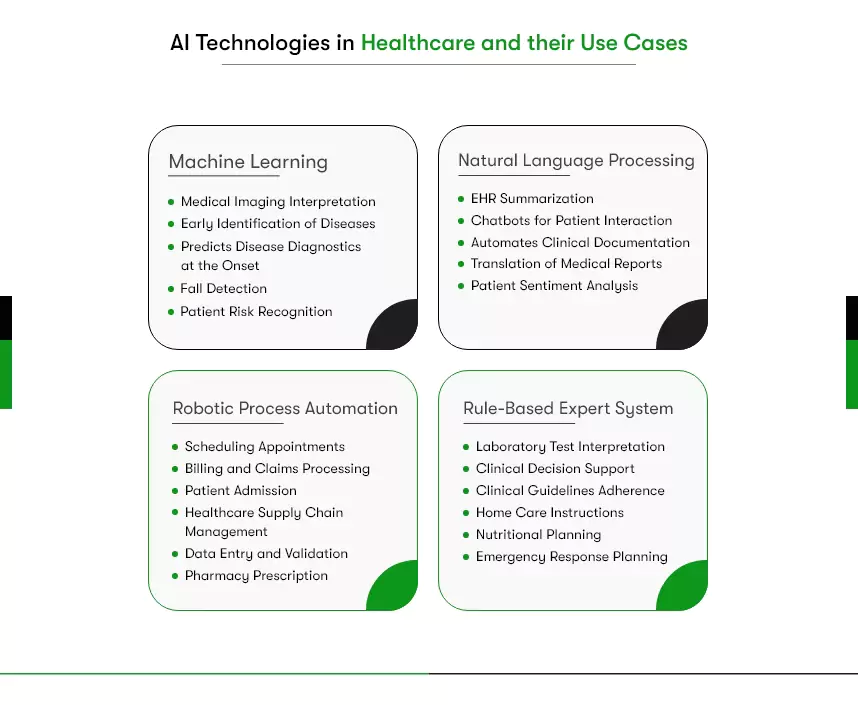
AI technology in healthcare uses machines to analyze and act on medical data, usually to predict a particular outcome. Using patient data and other information, AI can help doctors and medical providers deliver more accurate diagnoses and treatment plans.
Different solutions of AI implementation in healthcare amalgamate to transform this industry. Let’s take a look at them below.
Solutions of Artificial Intelligence(AI) in Healthcare
AI in healthcare consists of numerous technologies, each serving a specific function. While various AI technologies provide substantial advantages to the industry, the tasks and processes they support can vary. Let’s examine the different AI solutions in healthcare:
Precision Medicine: Redefining Treatment Strategies
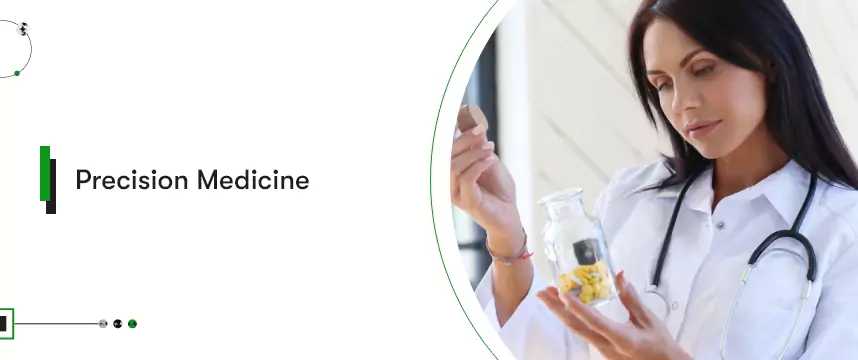
Understanding the Concept
The use of AI in healthcare significantly impacts genomics and genetics. The technology facilitates the identification of patterns in enormous data sets containing medical records and genetic information, thereby facilitating the discovery of disease-mutation associations. AI can tell doctors what happens in the cell when DNA is modified through therapeutic or natural genetic variation. For example, they can find connections between DNA flaws and other illnesses that haven’t been known before.
Benefits of Precision Medicine in Healthcare
Customized Care: With precision medicine, medical professionals may design treatment plans especially suited to each patient’s genetic and biological traits.
Early Disease Detection: Genetic analysis and predictive modeling allow for the early detection of risks, early intervention, and disease prevention.
Optimized Drug Selection: Genetic profiling helps to predict how patients will respond to drugs, which leads to better treatment selection and dosing.
Reduced Healthcare Cost: Precision medicine reduces trial-and-error methods, leading to more efficient resource use and lower healthcare expenses.
Treating Rare Diseases: AI technology in healthcare assists in the early and precise identification of rare diseases by identifying connections between genetic abnormalities, patient symptoms, and disease processes.
AI Technologies Applied in Precision Medicine
Machine Learning (ML): ML algorithms analyze massive datasets to identify trends, associations, and predictive markers.
Deep Learning: Deep Learning algorithms analyze complex biological data, such as genomic sequences and protein structures, and contribute to understanding disease mechanisms.
Predictive Modeling: AI structures predictive models which forecast disease risks, development, and treatment responses based on an individual’s genetic profile and other relevant data.
Practical Application: Precision Medicine Changing Lives
The Netherlands’ Prinses Máxima Centre for Paediatric Oncology, Utrecht, the Netherlands
It offers specialized care and conducts cancer research for children. It employs cutting-edge genomic technologies to identify genetic mutations in pediatric cancer patients. By tailoring treatment decisions to the specific genetic characteristics of each patient’s tumor, the center hopes to enhance treatment efficacy, reduce adverse effects, and advance pediatric oncology research.
AI-enabled Electronic Health Records (EHR)
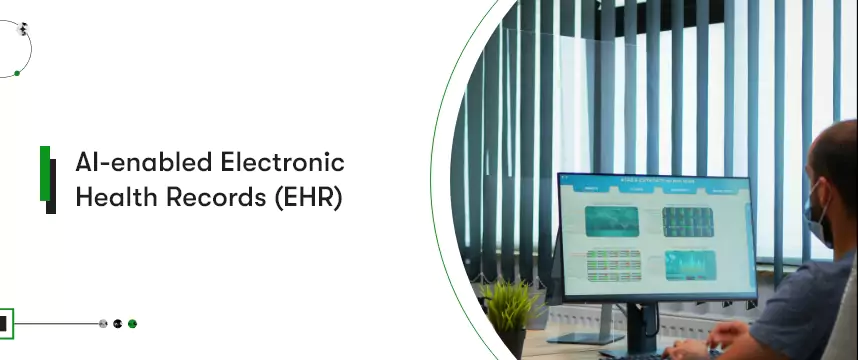
Understanding the concept
It is no secret that working in the healthcare industry can be stressful, and departments are often understaffed. Electronic health records (EHRs) are the digital equivalent of a patient’s complete medical record, including past diagnoses, current treatments, ongoing medications, test results, and more. It aims to create an encrypted and uniform platform for healthcare providers to store, retrieve, and exchange patient information.
Medical practitioners may concentrate more on patient care and other crucial aspects of their jobs if they spend less time on administrative activities. Maintaining records, analyzing scans, and entering data are all tasks that AI may assist with.
Benefits of AI in Electronic Health Record Systems
Improves Accessibility: Electronic health record (EHR) systems improve care coordination and continuity by allowing authorized healthcare workers to access patient details remotely.
Enhances Patient Care: The ability to access complete patient records quickly improves clinical decision-making, which in turn benefits patients via more targeted and specific care.
Saves Time: EHRs increase efficiency and productivity by eliminating or significantly reducing the need for paper records and manual data input, allowing healthcare practitioners more time to devote to direct patient care.
Decreases Manual Errors: Writing mistakes, unnecessary testing, and prescription mishaps are less likely when using easily readable and uniform computerized data.
Easy Data Exchange: Electronic health records (EHRs) provide interoperability, the interchange of data across healthcare organizations to improve communication and treatment for patients.
AI Technologies Applied in EHRs
Natural Language Processing: NLP derives valuable information from unstructured clinical text such as patient reports. NLP allows automatic data entry, coding, and insight extraction from clinical narratives.
Predictive Analytics: AI-powered predictive models analyze patient data from the past to identify trends, risk factors, and possible health outcomes. This facilitates early disease detection, identifies high-risk patients, and informs treatment plans.
Machine Learning: ML algorithms analyze EHR data to detect patterns, associations, and abnormalities. Using historical data, they can aid in predicting the progression of illness, patient outcomes, and treatment responses.
Practical Application: EHRs with an AI Advantage (Digital Transformation)
National Health Service, UK
The National Health Service in the UK implemented EHR systems to modernize healthcare delivery and improve patient care. It allowed for streamlined communication and coordination between various healthcare departments. Additionally, with less paperwork and manual data entry, healthcare professionals can devote more time to patient care.
If you are looking to transform your healthcare organization with AI enabled solutions, then you must go through our blog on: Digital Transformation in Healthcare 2023.
Remote Patient Monitoring
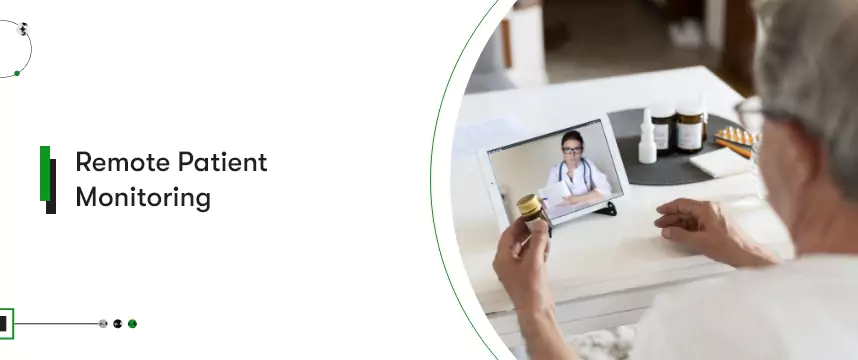
Understanding the Concept
With remote patient monitoring, the patient can receive care from home. AI implementation in healthcare allows for patient data transmission from a distance. In many remote areas where healthcare facilities are far and not easily accessible, remote patient monitoring with AI comes to the rescue.
Benefits of Remote Patient Monitoring for Healthcare
Reducing costs: Remote patient monitoring can lead to fewer hospital admissions and unnecessary visits, reducing healthcare costs.
Personalized Care: AI-powered RPM enables customized interventions based on patient-specific data, optimizing treatment strategies.
Chronic Disease Management: RPM aids in the management of chronic conditions by promoting continuous patient monitoring and timely intervention.
Universal Access to Healthcare: The hospital can provide the necessary care with relative ease for those residing in remote areas and requiring assistance.
AI Technologies Applied in Remote Patient Monitoring
Machine Learning (ML): ML algorithms examine patient data to recognize patterns and predict health trends.
Predictive Analytics: Using historical patient data and real-time inputs, AI models forecast potential health issues.
Pattern Recognition: Artificial intelligence in healthcare identifies abnormal patterns in patient data, prompting healthcare providers to receive alerts.
Natural Language Processing (NLP): NLP can process and analyze text or voice data generated by patients, providing insight into their symptoms and emotions.
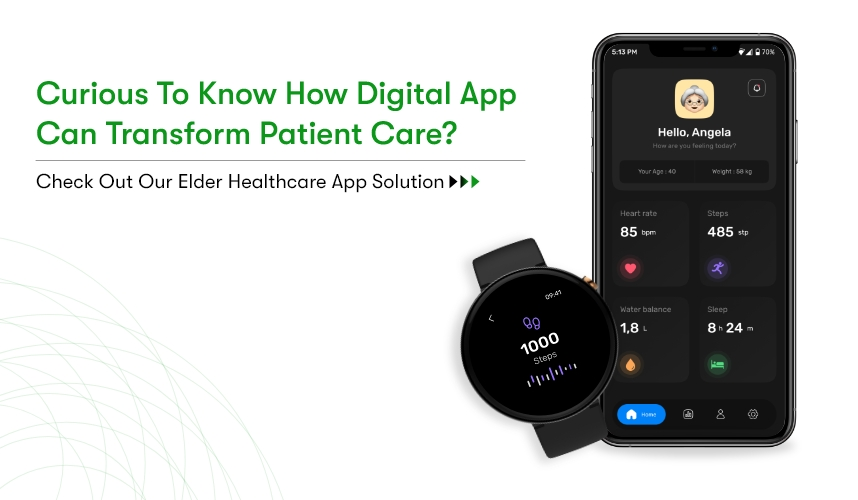
Practical Application: Reimagining Healthcare with Remote Patient Monitoring
University Hospital Heidelberg, Germany
The hospital’s stroke unit has set up a telemedicine program that enables remote monitoring of stroke patients after they leave. Patients receive wearable gadgets with sensors that continuously record information about their vital signs, movement, and activities. The hospital’s Stroke Unit receives the collected data via a secure digital platform.
AI enabled Patient Diagnosis
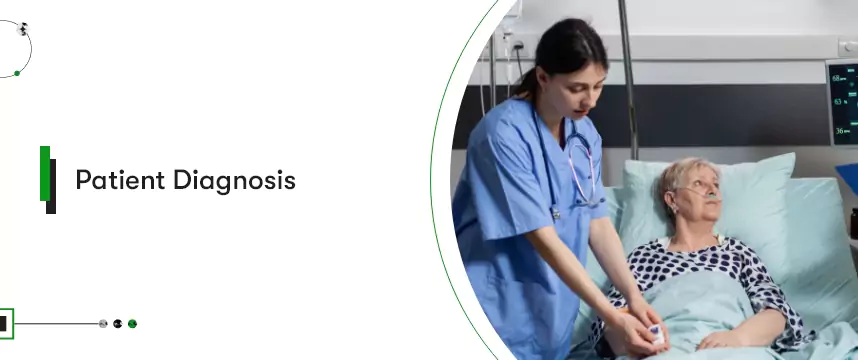
Understanding the concept
AI in healthcare facilitates medical decision-making, management, automation, administration, and workflows. It can be utilized to diagnose cancer, prioritize critical findings in medical imaging, identify acute abnormalities, assist radiologists in prioritizing life-threatening cases, diagnose cardiac arrhythmias, predict stroke outcomes, and aid in managing chronic diseases.
Benefits of AI enabled Patient Diagnosis
Faster Diagnosis: Diagnostic AI-powered tools can swiftly process and interpret data, allowing faster diagnosis and treatment initiation.
Healthcare Resource Allocation: AI can help prioritize urgent cases and streamline the diagnostic process, thereby optimizing the allocation of healthcare resources.
Risk Assessment: Artificial intelligence can calculate and assess disease risk factors, allowing doctors to make more informed patient care and follow-up decisions.
Multimodal Analysis: Artificial intelligence can integrate data from multiple sources (clinical, imaging, genomic) for a comprehensive diagnostic evaluation, enabling an all-encompassing assessment of the patient’s health.
AI Technologies Applied in Patient Diagnosis
Machine Learning (ML): ML algorithms analyze patient data to identify patterns, correlations, and trends contributing to accurate diagnoses.
Deep Learning: Deep neural networks analyze complex data, such as medical images, to extract features and recognize subtle abnormalities.
Natural Language Processing (NLP): NLP analyzes clinical notes, patient histories, and other textual data to assist in the diagnosis of conditions and information extraction.
Practical Application: AI-Powered Diagnosis for Coronary Artery Disease
HeartFlow
The AI-driven platform of HeartFlow analyzes cardiac CT scans to generate customized 3D models of patients’ coronary arteries. It assists cardiologists in diagnosing coronary artery disease and determining the most effective treatment plans.
AI Chatbots: Your 24/7 Health Assistants
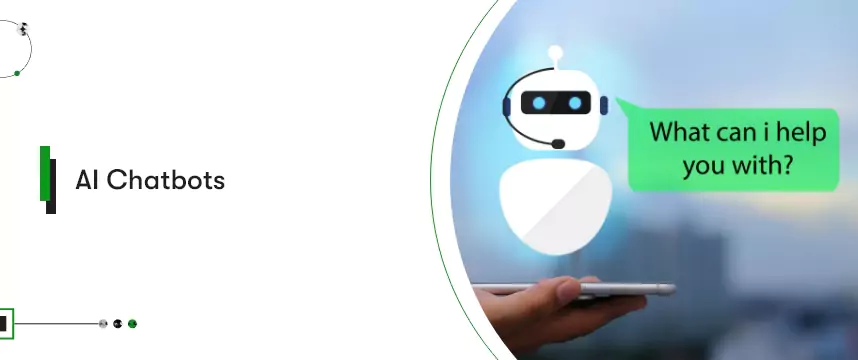
Understanding the Concept
With AI in healthcare, patients can not get personalized treatment recommendations at home. The patients have better and enhanced hospital access when necessary, and the AI chatbots further assist them. If the problems are mild, the patients are automatically advised to take the appropriate prescription. If a medical visit is required, the same is advised.
Benefits of AI-powered Chatbots in Healthcare
24/7 Accessibility: AI chatbots provide patients access to healthcare information and support around the clock, allowing them to request help anytime and immediately—even beyond regular business hours.
Appointment Scheduling: Chatbots may help schedule and remind patients of their appointments, increasing patient engagement and lowering no-show rates.
Medication Reminders: Chatbots can remind patients to take their medications and assist them in managing their treatment programs, which improves medication compliance and patient outcomes.
Symptom Evaluation: AI chatbots can assist patients with assessing their symptoms by providing initial evaluations and suggestions for the next steps.
Language Accessibility: Chatbots’ ability to converse in various languages makes them more accessible to non-native speakers and caters to the needs of a wide range of patient groups.
Cost Savings: AI chatbots help healthcare organizations and providers save costs by automating repetitive processes and inquiries.
Patient Engagement: Chatbots may encourage healthy habits and patient engagement by interacting with patients via interactive chats, tests, and surveys.
AI Technologies Applied in Chatbots
Natural Language Processing (NLP): NLP allows chatbots to grasp and react to user inputs and inquiries by enabling them to interpret and process human language. Using NLP, chatbots can extract meaning, context, and purpose from text or voice.
Machine Learning: ML helps the chatbot to learn from data and become better at responding over time. They can recognize patterns in user behavior and modify their behavior in response to the information they are given.
Robotic-Process Automation (RPA): RPA may automate administrative procedures like appointment scheduling, data input, and insurance verification, freeing up healthcare workers to concentrate on more challenging duties.
Practical Applicaiton: Virtual Healthcare with AI-Driven Chatbots
Thuisarts
One example of artificial intelligence in healthcare is Thuisarts. In the Netherlands, it is a platform that offers online consultations. Thuisarts provides an AI-driven chatbot tool for virtual consultations that interacts with people to understand their problems.
Medical Image Analysis: AI for Enhanced Diagnostics
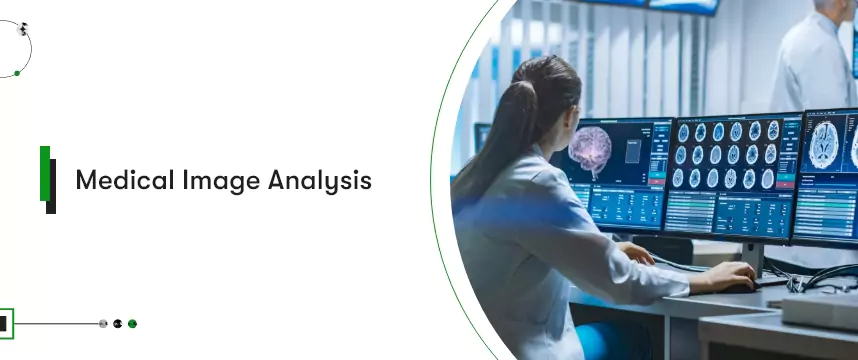
Understanding the Concept
You can now use AI in healthcare to identify abnormalities in medical images such as CT and radiology imaging. Image recognition helps doctors diagnose tumors, kidney, and liver infections and improve cancer prognosis.
Benefits of AI based Medical Image Analysis in Healthcare
Accurate Diagnosis: AI-powered image analysis increases the precision of disease detection and diagnosis, reducing human error and enhancing patient outcomes.
Early Detection: Identifying subtle abnormalities promptly enables early disease detection and intervention, which may improve prognosis.
Makes it Efficient: AI implementation in healthcare accelerates image analysis, allowing for faster diagnoses and reducing patient wait times.
AI Technologies Applied in Medical Image Analysis
Deep Learning: CNNs and other deep learning architectures are frequently used for pattern recognition in medical images.
Transfer Learning: It employs pre-trained models from general image datasets to enhance the performance of AI models on medical images, despite the lack of labeled medical data.
Natural Language Processing (NLP): Natural Language Processing techniques can analyze textual information linked to medical images, such as radiology reports or clinical notes. This can provide additional context when interpreting an image.
Practical Application: InnerEye Technology’s Impact
Addenbrooke Hospital in Cambridge
The InnerEye technology from Microsoft system scans for patients with prostate cancer automatically at the Addenbrooke Hospital in Cambridge. The technology uses an image to identify the problem with the prostate, identify cancers, and provide a report. This has sped up the treatment of prostate cancer, and the hospital is considering using the same technique for patients with brain tumors.
Clinical Trial Solutions: Advancing Research through AI
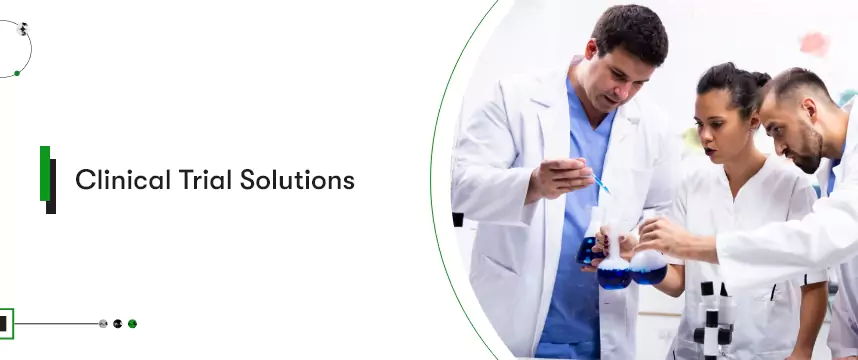
Understanding the concept
Using AI technology in healthcare makes different parts of the clinical study process go more quickly. It gathers data in real-time and lets researchers find patterns and make correlations. This information helps researchers decide what to do and speeds up the study.
Benefits of AI-enabled Clinical Trial Solutions
Accelerated Recruitment: By examining massive datasets, electronic medical records, and genetic data, AI in healthcare assists in identifying eligible patient candidates for clinical trials, hastening the participant recruitment process.
Trial Stage Development: Designing trials with optimized procedures, sample sizes, and outcomes using AI’s help increases trial success rates while also cutting costs.
Data analysis: AI systems look for patterns, trends, and treatment responses in complicated trial data, which helps with decision-making and reveals insightful information.
Tailored Treatment: AI makes it possible to identify patient subgroups that react to therapies differently, enabling personalized medicine methods.
Drug Discovery: AI-driven simulations and modeling that estimate new chemicals’ potential effectiveness and safety speed up the drug development process.
Risk Predictions: AI analyzes possible hazards and unfavorable outcomes in clinical studies, allowing proactive reduction measures.
AI Technologies Applied in Clinical Trial Solutions
Machine Learning (ML): To forecast patient reactions and improve trial design, ML systems examine patient data, trial results, and historical data.
Natural Language Processing (NLP): It extracts practical details from unstructured text data in patient records, trial protocols, and medical literature.
Predictive Analytics: AI-powered prediction models for analytics estimate trial results, patient enrollment rates, and possible bottlenecks.
Image Analysis: AI implementation in healthcare examines biomarkers and medical images to help with patient selection, illness monitoring, and therapy evaluation.
Practical Application: AI-Powered Solution for Zika Virus Illnesses
Sanofi and The Fraunhofer Institute for Molecular Biology and Applied Ecology
Sanofi and the Fraunhofer Institute for Molecular Biology and Applied Ecology in Germany worked together to identify a cure for illnesses caused by the Zika virus. Researchers used artificial intelligence in healthcare to sort through a database of licensed medications to find the solution. The AI study singled out the chemical “dyclonine,” which is often used as a local anesthetic.
If by now you are sure of the type of AI enabled healthcare product you want to build, then you must read our blog on: Why flutter is the ideal tech stack for development of medical applications.
What are the Challenges of AI Implementation in Healthcare?
As there are many benefits of AI healthcare applications, there are also several difficulties that must be overcome for them to be successfully implemented. The key obstacles are as follows:
Data security and privacy:
Healthcare data is sensitive, and preserving patient privacy is essential. AI implementation in healthcare applications must adopt strong security measures to secure patient data.
Lack of standardization:
Healthcare data are not presently standardized, which might make it challenging to integrate AI into various systems. Additionally, the absence of standardization makes comparing data from multiple sources difficult.
Ethical issues:
When using AI in healthcare applications, there are ethical issues to be aware of. For instance, there can be issues with algorithmic bias or the effect on patient autonomy.
Integration with current systems:
Integrating AI with existing healthcare systems might take time. The requirement for additional infrastructure and staff training in using the new technology may arise for healthcare providers.
These challenges highlight the need for meticulous planning to integrate AI into healthcare applications. You must balance tackling technical issues like standardization and system integration with ethical ones like patient data protection.
These challenges suggest that you should not overlook the importance of Healthcare IT consulting while planning to integrate AI into your healthcare operations. You must balance tackling technical issues like standardization and system integration with ethical ones like patient data protection.
How can Kody Technolab help?
This is just the start of a promising future. AI in healthcare is making it more effective and focused on the patient.
There are some problems that make it tricky to employ use cases of AI in healthcare in a beneficial manner. Nevertheless, by working with a company like Kody Technolab that has experience developing AI solutions, you can quickly get around these problems and make more accurate diagnoses, drug discoveries, and treatment plans.
With a team of skilled professionals, we can develop new AI-powered solutions that meet the needs and overcome the challenges of the healthcare business. By working with us, you can use AI in healthcare to its fullest extent.

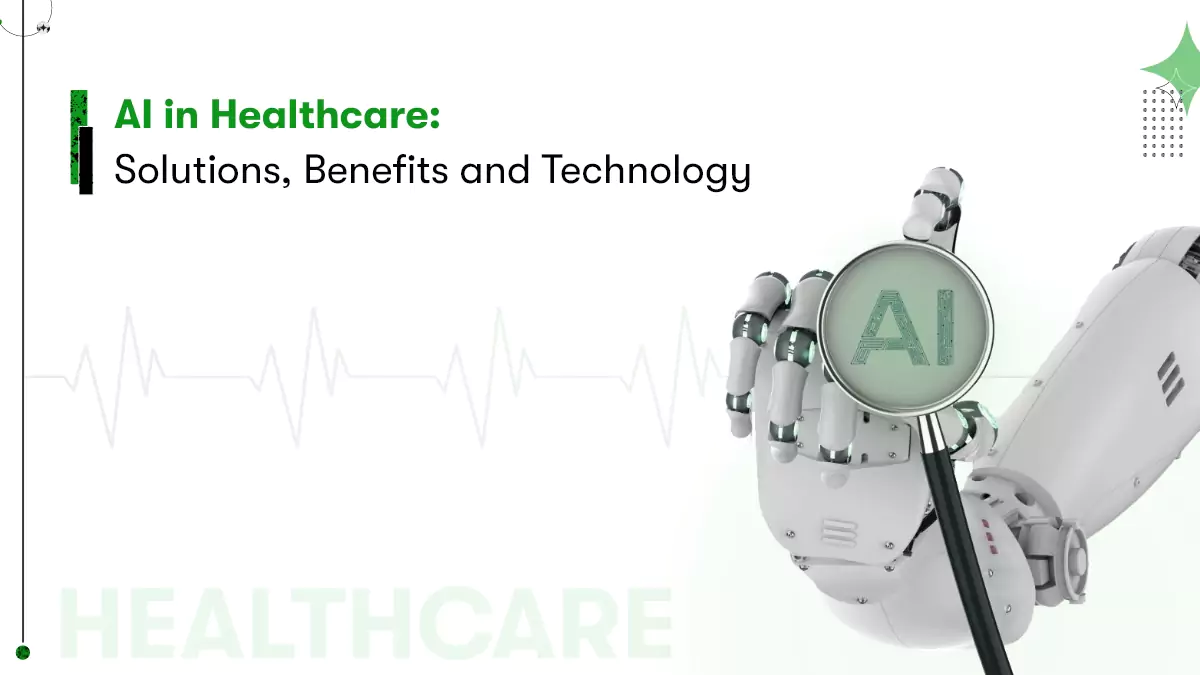
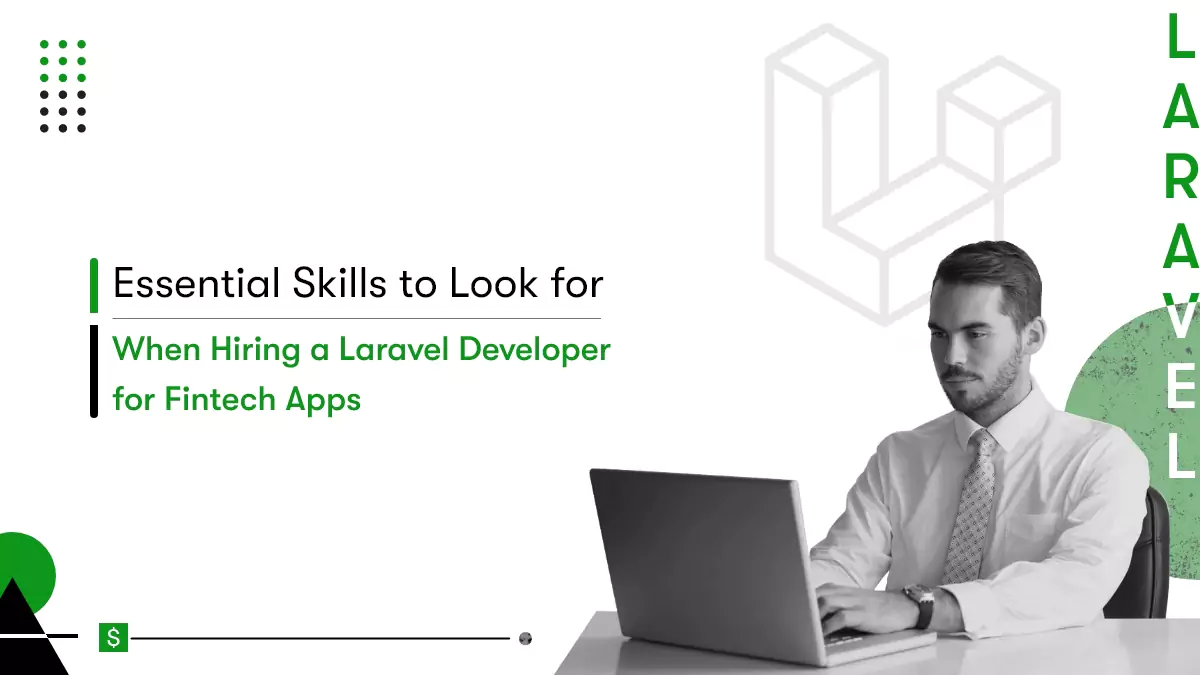
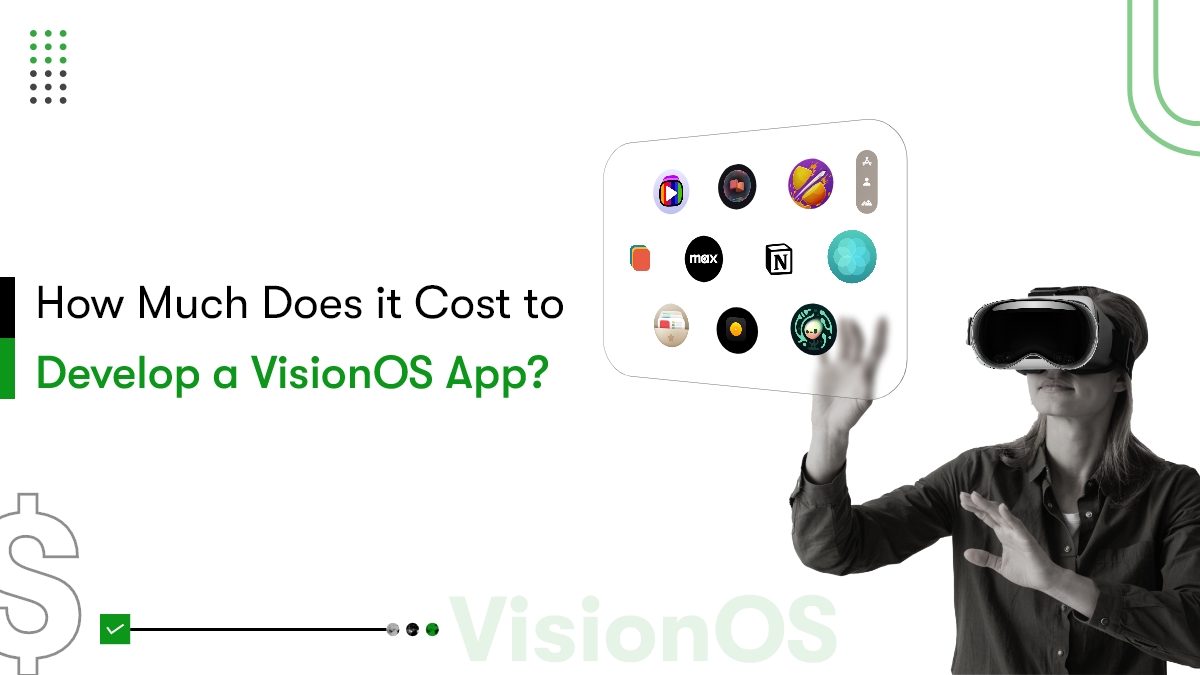
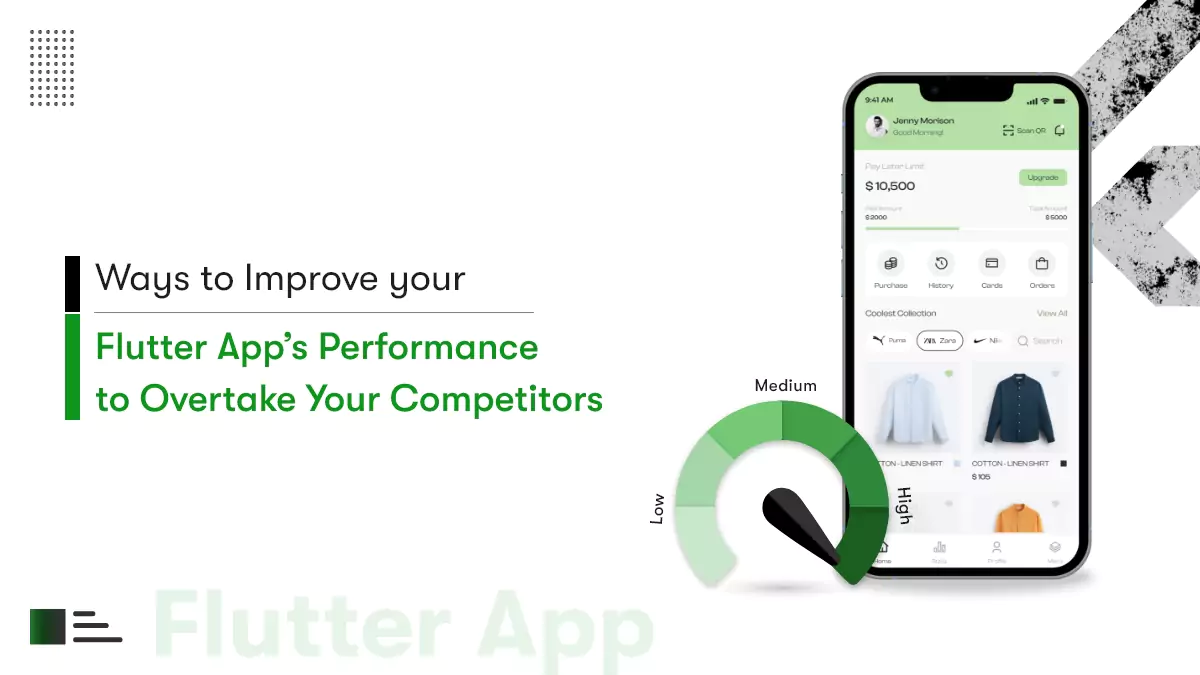
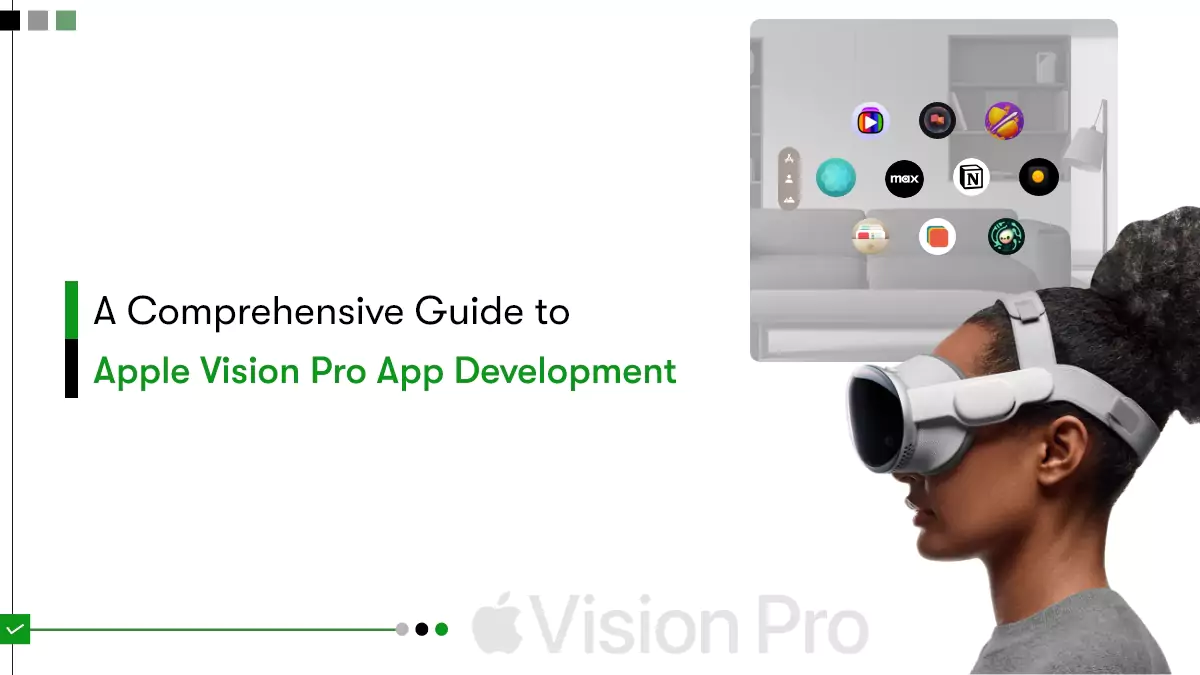
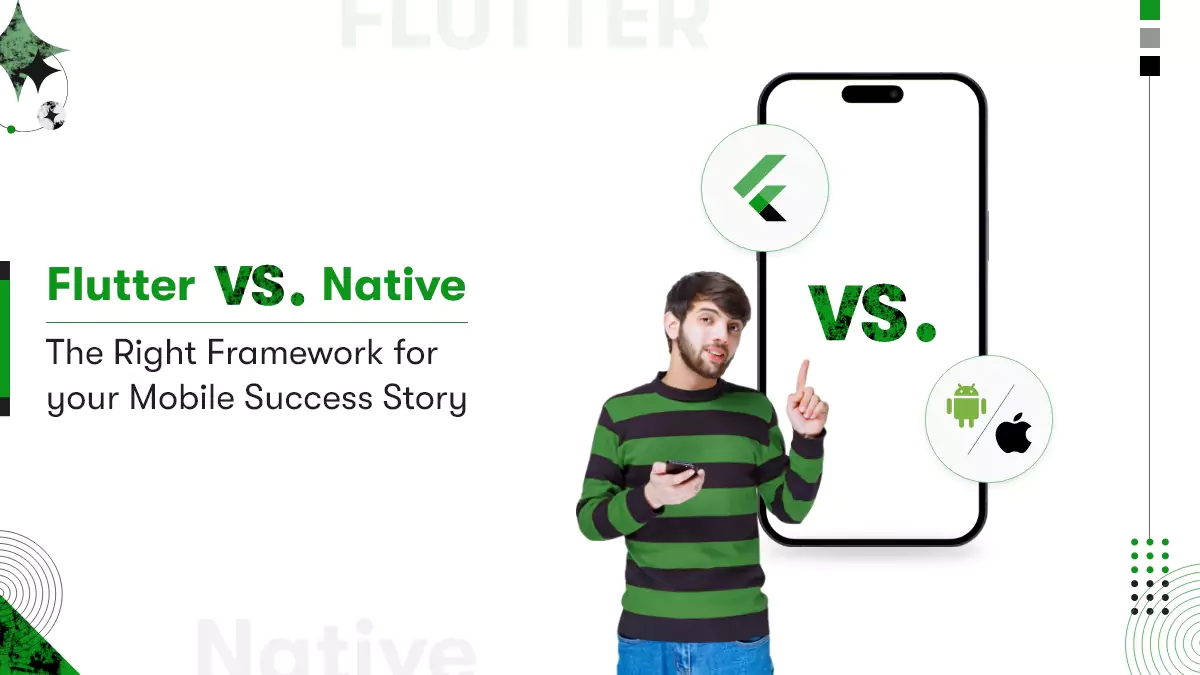





 Contact Information
Contact Information